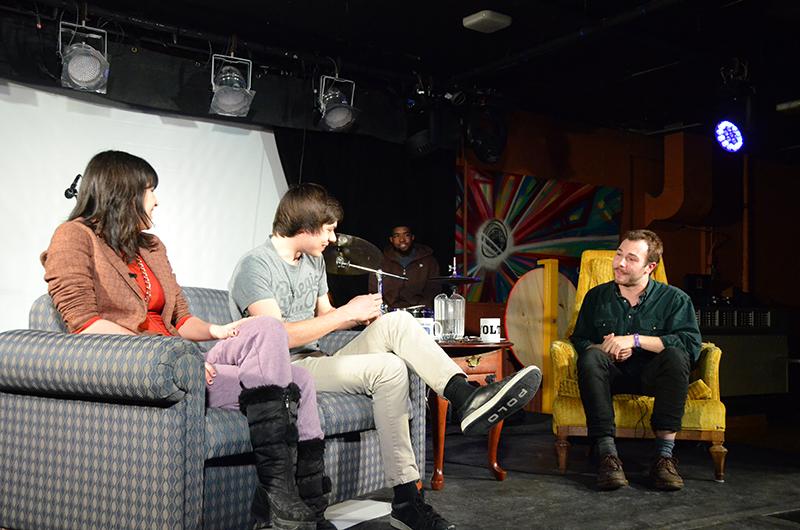New Oberlin-Centric Late-Night Show Features Student Comedians
February 20, 2015
In case you haven’t heard from one of your folk music–loving friends or seen them hanging out at The Local drinking coffee and eating bagels, Punch Brothers are back in town. The American experimental folk and bluegrass band spent a week conducting workshops at the Conservatory culminating in a concert at Finney Chapel on Thursday night. The performance kicked off a three-month tour across the U.S. to promote their new album The Phosphorescent Blues. The band has served as artist-in-residence at Oberlin since the fall of 2013 and continues to bring its genre-bending sound and energy to campus through insightful panels, high-energy jam sessions and uplifting concerts.
Mandolinist Chris Thile discussed the fundamental divide between classical and folk in a panel about bluegrass on Monday. Thile claims that the best musicians signal the creation of new genres by fusing their “intuitive flame” with a desire to make the music “faster, higher and louder.”
Band member Gabe Witcher expanded on this idea: “There was really great music in the past that resonated with people so much.” However, he said, both bluegrass and classical are facing a decline in popularity, due to being generations out of touch with the “initial impulse that drove that music to be that good.” In a sense, both bluegrass and classical music have not only become perceived as dying arts but as a way to transport listeners back to the golden age of that music.
Punch Brothers’ current struggle is to find creative ways to revisit the initial spark of musical greatness and fan the flames of a new kind of music that is free of labels such as classical and folk. The Phosphorescent Blues, released on Jan. 23, exemplifies the band’s unique approach to music making. According to Witcher, Claude Debussy’s work was the main musical influence for the album’s compositional style, featuring experimental harmonies that predate those of jazz. The band even covered Debussy’s “Passepied” as the third track on their album. Both Punch Brothers and Debussy employ an impressionist approach in their music through the use of harmonic and orchestral colors that give the listener the true sense of what the song is about.
So, what is this album about? Well, if you listen closely to the lyrics: cell phones. More generally, the album centers on what Witcher describes as the “inevitable human impulse to connect with others,” and how that impulse is exploited and amplified by modern technology, according to Witcher. Witcher, who got his first email address while he was in college, believes that “[technological] devices have permeated every aspect of … [peoples’] lives at this point,” altering the ways in which individuals communicate, create art and capture memories. Witcher candidly admitted to being guilty of using his phone to snap a quick low-quality video while at a Van Halen concert, only to show it to a few friends and wonder “how much better might it have been if [he] had just let him walk by me and perform.”
Many performing artists like Punch Brothers are taken aback when they pour their hearts out on stage only to look up and see a wall of cell phone cameras. Interestingly, Punch Brothers exploited the technology of this 21st-century misfortune in their song “Little Lights” by asking fans to send in recordings of themselves singing the chorus to the song to create a virtual choir that Punch Brothers mixed in the studio. The song, which describes the experience of standing onstage basking in the glow of tiny cell phone screens, ends the album with the words: “Guide us back to where we are, from where we want to be” — an anthem of the diffusion of modern attention.
“You’re not gonna be able to get away with just making a record any more,” Witcher said. “You’re gonna have to find ways to let people see you. That’s how people are experiencing music now.” Instead of increasing their technological presence, Punch Brothers have been spending plenty of time hiding out in northern Ohio and completing their last few production sessions for the album.
The Conservatory’s atmosphere has heavily impacted the band’s work ethic and attitude toward writing a new album. According to Witcher, this means being surrounded by forward-looking musicians who crave new challenges and sounds they can sink their teeth into. Punch Brothers have used the musical and intellectual atmosphere at Oberlin to find new strength and clarity in their songwriting. Witcher, who learned to play drums from scratch in order to perform the new album on tour, advises budding musicians to “keep doing what you’re doing, with your ears open and your hearts open, and always keep your ego out of the way of your learning.”

















